This week we heard from some of the more than 400 Ukrainians who have lived in Youghal, Co Cork for the past couple of years but have now been told they have to move.
We heard how most had moved to the Quality Hotel in Redbarn outside Youghal in 2022 and how they had integrated into the community.
11-year-old Nadia said how upset she was at the prospect of having to leave.
"I like the school and I have so many friends in this hotel. I don't want to leave. School is so important to me. I left behind my friends, father, my sports and my house in Ukraine."
However Nadia's story is not unique.
On Friday, RTÉ's Morning Ireland reported that that around 110 Ukrainians who have spent the last two years living at a former holiday village, The Avon in Blessington in Co Wicklow, have been told they will be relocated in just over two weeks' time.
A couple of days earlier the Irish Examiner carried a report on 54 Ukrainians who had been living in student accommodation in Limerick were also given notice that they would be moved, and like the families in Youghal, they were told they could not bring their pets.
In each of these reports we heard accounts of upset, uncertainty and positive integration being unravelled.
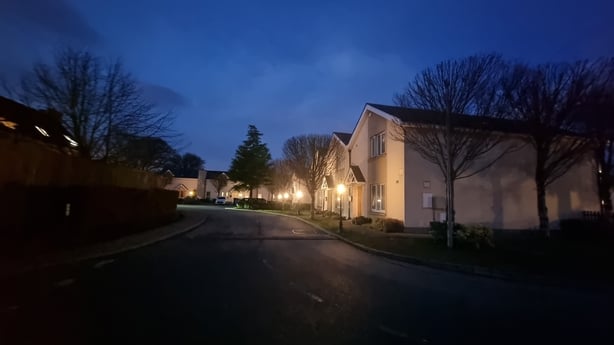
This happened to thousands and thousands of Ukrainians last year.
According to the Department of Integration, last year 424 contracts to provide accommodation to Ukrainians fleeing the war came to an end.
These contracts provided accommodation for around 15,000 people - and it is happening to thousands this year too.
RTÉ understands that over 5,500 Ukrainians are being told they need to move in the coming weeks because their accommodation contract has come to an end.
All of this comes against the backdrop of a number of changes made by the Government last year to how it supports people fleeing the war in Ukraine, with the stripping back of access to accommodation and financial supports depending on when someone arrived and where they lived.
The Department of Integration said these changes were being made "to continue to meet the EU Temporary Protection Directive requirements, and to align more closely with other EU Member States."
Watch: RTÉ News report from Youghal where more than 400 Ukrainian people have been told they will have to move to new accommodation
We need your consent to load this rte-player contentWe use rte-player to manage extra content that can set cookies on your device and collect data about your activity. Please review their details and accept them to load the content.Manage Preferences
Almost three years into the war in Ukraine, the conflict continues and EU-wide temporary protection extended to Ukrainians has been extended until March 2026.
As of 5 January more than 113,000 Ukrainian Beneficiaries of Temporary protection were issued with PPS numbers, However the CSO estimates that 75%, which is almost 85,000, of these remain in Ireland.
For a long time the majority of those who fled the war and came here were accommodated in State -contracted accommodation such as hotels and guesthouses.
This peaked in October 2023 when more than 60,000 Ukrainians were living in these kinds of settings.
That figure has since fallen to just over 28,000 this month, and the Department of Integration has made it clear this week that it wants to see this trend continue, and that people would move on "to make longer term independent arrangements if they decide to remain in Ireland."
At different stages the State has referred to this as "short-term accommodation", "supported accommodation" and in Department's statements issued this week "emergency temporary accommodation".
But as we know from the stories emerging from Youghal, Blessington and Limerick, this "temporary" accommodation became home for many who have lived in these settings for years.
Initially this accommodation was offered free to Ukrainians fleeing the war, but charges for food, WiFi and laundry were later introduced.
Changes to welfare support
Ukrainians were also given access to the same welfare supports as Irish citizens when they first arrived.
However, 14 March 2024 brought big changes for new arrivals.
After this date, those who arrived here fleeing the war in Ukraine were only offered State provided accommodation for a three maximum of three months, and a new term was coined for where.
They were moved into 'Designated Accommodation Centres'.
Unlike those who came before them, the new arrivals in these 'Designated Accommodation Centres' are only paid €38.80 per week per adult and €29.80 per week per child, for the duration of their stay, which is the same as what is paid to asylum seekers in International Protection accommodation.
Once their three months in the 'Designated Accommodation Centre' are up they have to leave.
From the State's perspective they are effectively on their own, save for the fact that they can now apply to standard social welfare assistance, which they could not do when accommodated by the State.
There is one other State support that they might benefit from and that is if they get offered or find pledged accommodation.
This is where where the property owner gets a monthly payment of €800 if they share part of their home with, or offer a vacant home to, a Ukrainian war refugee.
This has become an important plank in the accommodation offerings for Ukrainians, as there are more than 35,000 living in pledged accommodation.
That is around 7,000 more than are living in hotels and guesthouses.
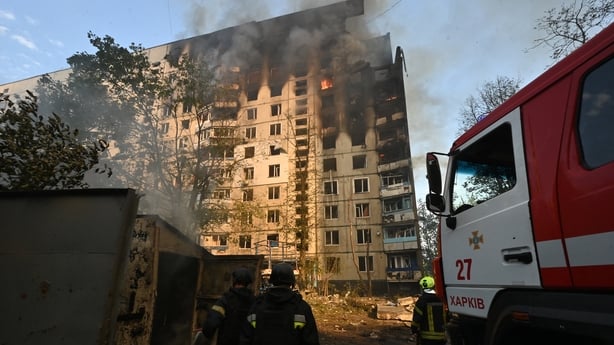
The payment that underpins this is called the Accommodation Recognition Payment and currently it runs out in March, but more on this later.
After those initial changes were made for new arrivals, it wasn't long before financial supports were slashed for some of those pre-March 2024 arrivals too.
In September the minister designated all full-board accommodation settings for Ukrainians, such as hotels, as 'Designated Accommodation Centres', and as a result all adult Ukrainians already living in them had their social welfare entitlements cut to €38.80 per week.
Those who were previously in receipt of the carers allowance or disability payments also lost them, and with that they also lost their right to free travel.
The Department of Integration said that was "to bring equivalence of treatment" to new arrivals and those here a long time living in similar settings.
However, there has been no change yet for Ukrainians living in self-catering accommodation.
The number of Ukrainians arriving to Ireland has fallen.
In December 2022 the highest weekly arrival figure was 1,273, but last month it was 262, and the weekly average is now 189.
The Department has said it is "carrying vacancies in commercial contracts" for accommodation for Ukrainians, so that would mean it was paying for some empty beds.
"As a result, the Department ends contracts on a regular basis in order to ensure value for money and greater oversight of the portfolio," a Department spokesperson said.
So that's one of the reasons it has given for ending hotel contracts.
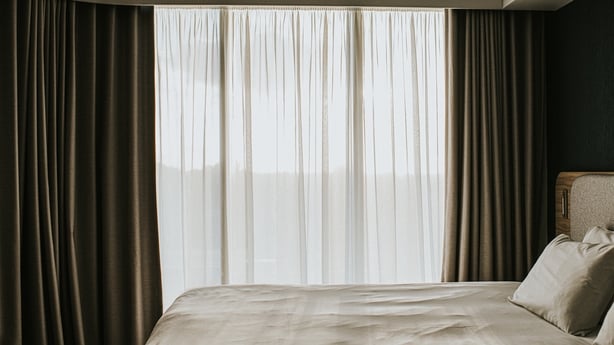
It also said that some providers want to end contracts or at least not renew them "in order to return to the private sector", so that could be a hotel returning to tourism, or student accommodation returning to offering accommodation to students.
Others, it says, want "to offer their accommodation for other uses."
And that brings me to International Protection accommodation.
The Department of Integration said "the need for accommodation for International Protection applicants is increasing and experiencing significant shortages, with over 3,000 people left without an offer of accommodation in 2024."
Last year saw a record number of asylum seekers applying for International Protection in Ireland - 17,535 as of the end of November.
For over a year now the Department of Integration has said that it cannot offer any accommodation to all people seeking asylum in Ireland, citing a "severe shortage."
The number of those left without any has now reached 3,244 and we have seen at least some rough sleeping as a result.
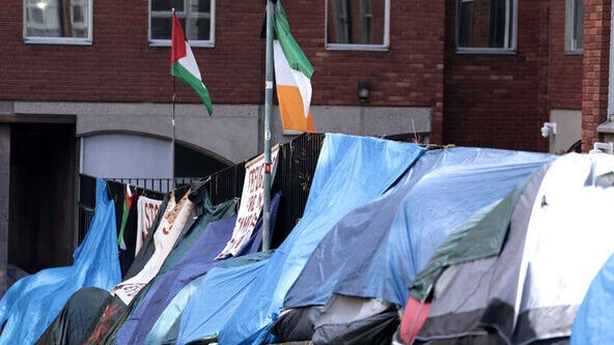
Currently all of those left without accommodation are men, as offers are still being made to women and children, as well as men who are deemed to be particularly vulnerable.
There are also 32,789 people, another record number, living within the International Protection accommodation system.
This includes 681 male asylum seekers living in State-provided tents.
Amid this ongoing accommodation shortage, the Department has said that some accommodation providers that previously housed Ukrainians are willing to change over to offering accommodation to International Protection applicants instead, and that this is what is happening in Youghal.
However, despite the demand, the figures for this were not huge last year.
Out of the 424 contracts to provide accommodation to Ukrainians that came to an end, 11 providers switched to exclusively offering international protection accommodation.
According to the Department "these represented approximately 1,400 beds".
RTÉ understands that around 1,800 more beds will move from being offered to Ukrainians to being used by International Protection applicants as contracts come to an end in the coming weeks.
For the some 5,500 Ukrainians receiving letters telling them they must leave the accommodation they have been living in over the coming weeks, attention turns to what next for them.
They can move to the alternative accommodation that will be offered to them, but they are unlikely to find out where that is until closer to the time.
The Department has also confirmed that anyone with pets will not be able to bring them with them to the new accommodation.
In the past some accommodation providers were "pet friendly", but its clear that is something the Department no longer supports.
"The Department does not provide accommodation for pets, and this has been made clear to people who have requested State-contracted accommodation. Responsibility for pets rests with their owners," a spokesperson said.
As for where people go next, the a Department spokesperson said that "every effort will be made to keep them as close to their current location as possible" but then added that "given the significant number of moves planned, this may not always be possible."
In relation to Youghal, they said that they are looking to see what vacancies may be available in the area.
Otherwise they said that people "are also free to make their own private arrangements for accommodation in the area".
To that end they are suggesting "privately renting", but it is worth noting that Ukrainian refugees are not entitled to the Housing Assistance Payment (HAP)
Renting is something the residents of the Quality Hotel in Youghal have said they are looking into.
"The rent is very high here. It is hard to compete (in the rental market). Not many people are renting in Youghal. To find something is almost impossible now," one resident called Mila told RTÉ's Jennie O'Sullivan.
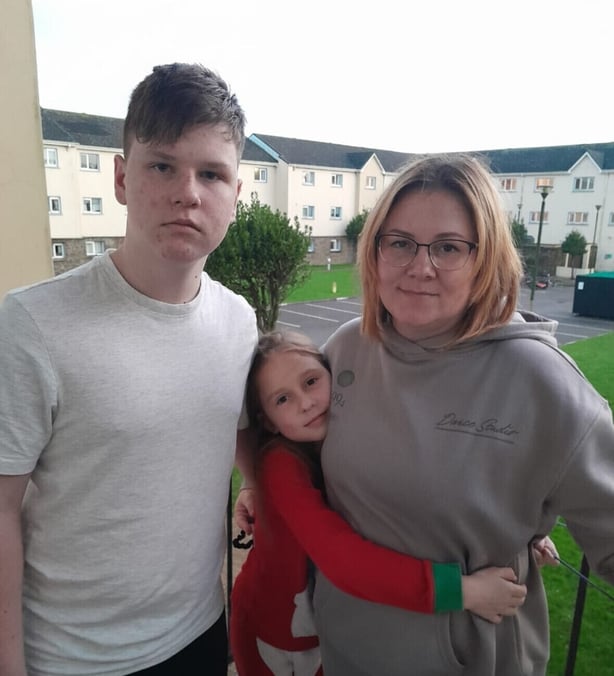
And then there is pledged accommodation.
Over 35,000 Ukrainians currently live in pledged accommodation, and offers are still being made.
RTÉ News understands the local authorities' Offer a Home Scheme is placing around 200 people in pledged accommodation a month, and the same number again are being placed through pledges co-ordinated by the Irish Red Cross working with the International Organization for Migration and Helping Irish Hosts.
However, the vast majority of pledges do not come through either scheme but are privately organised.
This is where a Ukrainian refugee finds a property owner, on social media or otherwise, who is willing to share accommodation with them, or to offer them a vacant property, and the property owner is paid the €800 per month Accommodation Recognition Payment.
These kinds of arrangements now account for 67% of new placements in pledged accommodation each month.
It is likely that those Ukrainians who are facing a move, but who want to remain in an area, will look to see if there are any willing hosts.
But finding pledged accommodation for more than 400 people in Youghal, or anywhere else, is a big ask.
As it stands the tax-free €800 payment that might entice property owners to give this a go expires on 31 March, which adds another layer of uncertainty.
The Department confirmed that this expiration date remains in place but said "it may be extended by the Minister for Children, Equality, Disability, Integration and Youth in accordance with the governing legislation."







